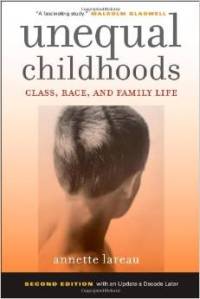Class is rarely talked about in the United States; nowhere is there a more intense silence about the reality of class differences than in educational settings.
— bell hooks
One of the things teachers often hear in the course of teacher education is that school culture typically reflects middle class culture. For teachers who grew up middle class, this statement can be perplexing. It’s like trying to alert fishes to the unique presence of water: they are so immersed in it that alternatives cannot be fully imagined.
Yet class shapes everything from interactional styles to the kinds of competencies valued in the home. In her famous ethnography of class and American childhoods, Annette Lareau characterized working class and poor families as tending to promote natural growth in children. These parents tend to let children determine their leisure activities. When they interject authority, they tend to do so with directives.
In contrast, middle-class families tended to practice a form of parenting Lareau calls concerted cultivation. These parents tended to equate good parenting with deliberate development of their children’s talents, especially through organized leisure activities. They also used fewer directives, instead reasoning with their children when seeking to change their behavior.
(There are other contrasts between these approaches to parenting, as summarized in this table.)
Lareau’s point is not that one style is better than the other, but instead to point out that school often assumes middle class parenting, leaving poor and working class families with less of an institutional fit. In fact, as somebody who was raised in this manner, I personally see many strengths that come out of the accomplishment of natural growth. Children have more opportunities to develop autonomy and engage in more social problem solving than children whose leisure activities are organized and led by adults.
How do these middle class assumptions play out in school? Classrooms are crowded places, and teachers frequently need to direct children’s attention and activities. Many teachers tend toward the middle class style of suggesting a transition (“Would you like to join us on the rug?”) rather than directing it (“Please come to the rug now”). If you are used to the latter, the former can be understandably ambiguous and confusing.
What is more, middle class children, through their greater experience with formally organized leisure activities, usually come to school with tacit understandings about how to participate. They have more experience responding to the authority of a non-kin adult with whom they will likely form a superficial and transitory relationship. In contrast, if your early socialization has been primarily with family, taking directions from a stranger may seem like a strange and maybe not entirely wise endeavor.
There are also subject-specific ways that social class makes school more or less a fit with children. Valerie Walkerdine has documented the ways class can interact with mathematics education in particular. She points to the quantitative fictions common to math class, describing, for example, an elementary number game requiring the “purchase” of various items for 1 to 10 pence and then making change. The working class children she observed, whose lives were much more consequentially tied to actual prices of things, found the premise of the game absurd. As I often tell my pre-service teachers, which of your students knows where to find the best price on a gallon of milk, and which simply look to make sure it’s organic? How does that change your job in making sure the cost in your word problem is realistic?
To feel comfortable participating in classrooms, children need to have a reason to be there. They need to see a connection to their lives and experience a sense of belonging. Social class differences are sometimes the source of cultural barriers to feeling like you belong in school, that school is a place that matters, that things make sense. Teachers need to be thoughtful in how they bridge these differences with their students.

Pingback: Rules – Consistent. Creative. Complete.